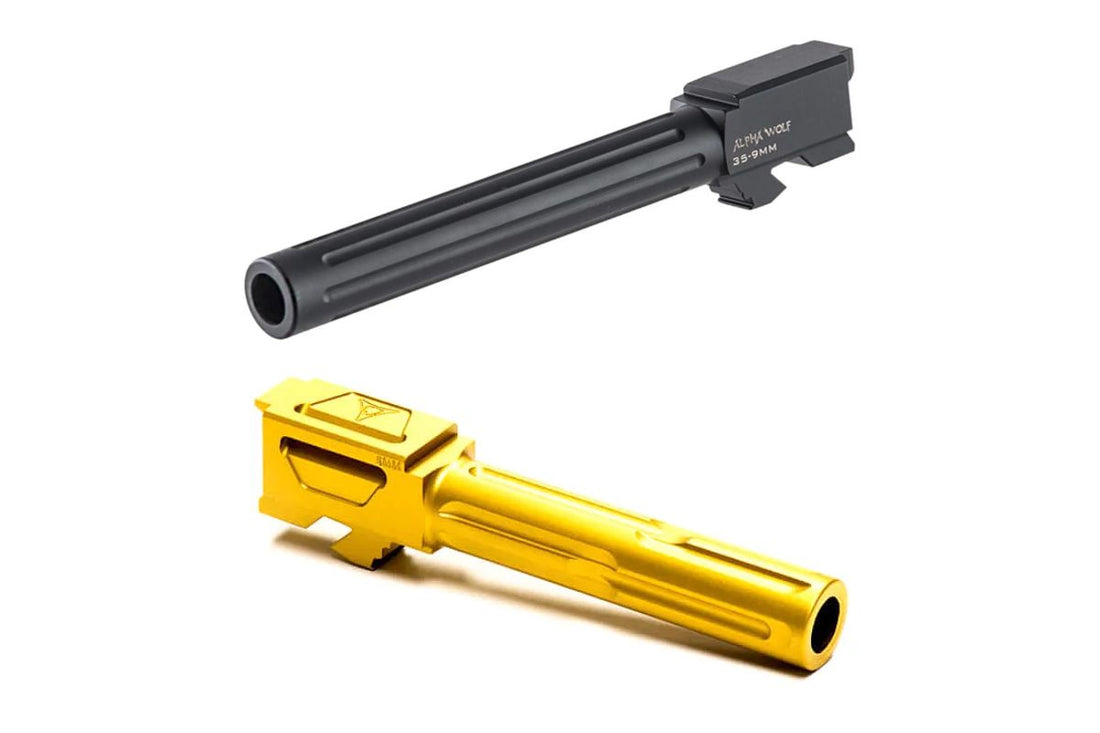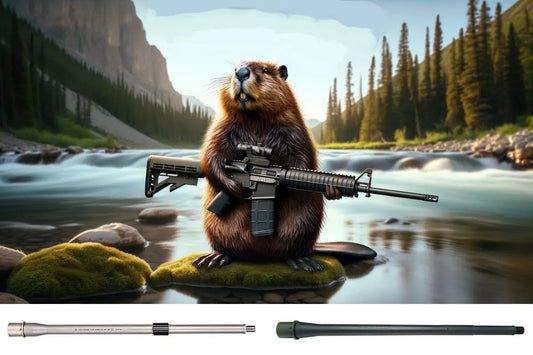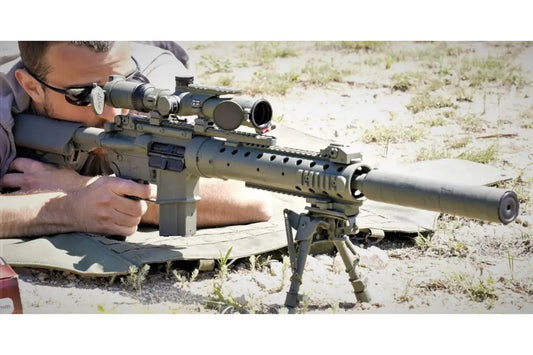
Are Aftermarket Glock Barrels Worth the Upgrade? A Detailed Comparison with Factory Barrels
When it comes to handguns, the Glock has built a rock-solid reputation for reliability, durability, and ease of use. Glock factory barrels are a major contributor to this reputation, providing consistent performance for everyday carry, law enforcement, competition shooting, and more. However, with the increasing availability of aftermarket barrels, many Glock owners are left wondering: are aftermarket Glock barrels truly better than the factory ones, and are they worth the investment?
In this article, we’ll take a closer look at Glock factory barrels versus aftermarket barrels, explore their differences, and analyze whether an aftermarket upgrade is really worth it for the average shooter.
- Material and Durability: Does the Aftermarket Offer Better Quality?
Glock’s factory barrels are made from high-quality steel, known for its excellent durability and resistance to corrosion. The barrel is designed to withstand thousands of rounds without a hitch, ensuring long-term reliability under most conditions. Factory barrels are also cold-hammer forged, which adds to their strength and longevity.
Aftermarket barrels, however, often boast premium materials such as stainless steel or match-grade steel, which are marketed for their improved hardness and corrosion resistance. For example, Lone Wolf AlphaWolf barrels are made from high-grade 416R stainless steel, which is not only more durable but also more resistant to the elements than Glock’s stock barrels.
Which is better?
- If you’re primarily concerned with durability under extreme conditions or heavy use, aftermarket barrels made from stainless steel might be an upgrade, but for everyday use, the factory Glock barrel is more than sufficient.
- Accuracy: Will You Really See a Difference?
One of the biggest selling points for aftermarket barrels is the promise of improved accuracy. Glock factory barrels are known for being “combat-accurate,” which essentially means they’ll hit center mass at self-defense distances without issue. However, they aren't precision barrels.
Aftermarket manufacturers, like ZEV Technologies and Agency Arms, claim that their barrels can significantly improve accuracy, particularly at longer ranges. Many aftermarket options are match-grade, with tighter tolerances and more consistent rifling than factory barrels. This often results in tighter groupings, especially for competition shooters.
The reality of improved accuracy:
- For the average shooter engaging targets at typical self-defense distances (7-15 yards), the accuracy gains from an aftermarket barrel might be negligible. However, if you’re involved in competitive shooting or frequently shoot beyond 25 yards, you may notice a tangible improvement in shot placement.
- Customization Options: Aftermarket Wins Hands Down
When it comes to customization, aftermarket barrels offer far more options than Glock’s stock offerings. Most Glock factory barrels are limited to a basic black finish, and there’s little room for aesthetic or performance customization. In contrast, aftermarket barrels are available in a variety of finishes, colors, and threading options.
For example, Faxon Firearms barrels come in a wide array of finishes such as black nitride, gold titanium nitride (TiN), and rainbow PVD, allowing shooters to give their Glock a personalized touch. Threaded barrels are also a popular aftermarket option, allowing users to easily attach a suppressor or compensator to their Glock, something Glock factory barrels typically don’t offer without special ordering.
Customization options with aftermarket barrels:
- Threading for suppressors and compensators
- Fluted designs for weight reduction
- Color and finish options, from stainless to titanium nitride
- Custom engraving for a personal touch
If you want to turn your Glock into a showpiece or add functionality like suppressor capability, aftermarket barrels are the clear choice.
- Cost: Is It Worth the Money?
Glock factory barrels are relatively inexpensive, considering their quality and longevity. For most users, they offer an excellent balance of cost and performance. However, aftermarket barrels can vary widely in price, from more affordable options like Killer Innovations Velocity barrels, which start at around $150, to high-end match-grade barrels that can exceed $300.
When considering cost, it’s important to ask yourself what you’re hoping to gain from the upgrade. If you’re primarily interested in aesthetics or suppressor threading, an aftermarket barrel might be worth the price. However, if you’re simply looking for improved accuracy at self-defense distances, you might not see enough of a difference to justify the cost.
Bottom line:
- Aftermarket barrels range from $100 to $300+, while a factory replacement barrel costs much less. If you're upgrading purely for function, weigh whether the marginal performance improvement is worth the price difference.
- Barrel Profile: Polygonal vs. Traditional Rifling
Glock’s factory barrels use polygonal rifling, a type of rifling that creates a smoother, tighter gas seal than traditional rifling. This increases velocity and potentially adds to the longevity of the barrel by reducing the friction and heat generated during shooting.
Most aftermarket barrels, such as those from ZEV Technologies, SilencerCo, and True Precision, use traditional lands-and-grooves rifling. This type of rifling is often preferred for shooting non-jacketed (lead) bullets because it reduces the buildup of lead, which polygonal rifling can struggle with.
Which rifling is better?
- For most shooters using jacketed ammunition, the difference between polygonal and traditional rifling is minimal. However, if you reload your own ammo or prefer lead bullets, an aftermarket barrel with traditional rifling might be a better choice.
- Compatibility with Different Ammunition Types
One of the benefits of aftermarket Glock barrels is their ability to handle a wider variety of ammunition types. Glock factory barrels are optimized for jacketed bullets, but many aftermarket barrels, like those from StormLake and KKM Precision, are designed to safely fire lead ammunition, which can be more cost-effective for frequent shooters.
Additionally, some aftermarket barrels are chambered for more precise tolerances, which can lead to better accuracy with certain types of ammunition. They also tend to offer more generous chamber dimensions, allowing for easier feeding and ejecting of rounds in some cases.
Who benefits from better ammo compatibility?
- Reloaders and those who shoot lead bullets may find significant value in an aftermarket barrel, while casual shooters using factory ammunition might not notice much difference.
- Is an Aftermarket Barrel Necessary for Self-Defense?
One of the main concerns for Glock owners is whether an aftermarket barrel is necessary for self-defense. While aftermarket barrels can offer advantages in terms of accuracy and customization, Glock’s factory barrels are incredibly reliable and have been tested in numerous law enforcement and military applications.
For most self-defense scenarios, a Glock factory barrel will perform flawlessly. Aftermarket barrels might provide an edge in competition or range scenarios, but for defending your home or carrying every day, the factory barrel is more than adequate.
Conclusion: Should You Upgrade to an Aftermarket Glock Barrel?
The decision to upgrade to an aftermarket Glock barrel depends largely on your specific needs and preferences. If you’re a competitive shooter or someone who reloads lead ammunition, the benefits of improved accuracy, durability, and customization may make an aftermarket barrel worth the investment. However, if you’re using your Glock primarily for self-defense or casual range shooting, the factory barrel is likely more than sufficient.
For those looking to customize their firearm’s aesthetics, add threading for a suppressor, or enhance accuracy for competition, aftermarket barrels like the ZEV Technologies Pro Match Barrel or Lone Wolf AlphaWolf Barrel are excellent options to consider.
Ultimately, it’s important to weigh the benefits of an aftermarket barrel against the cost. Whether you’re in it for performance, aesthetics, or both, there’s no shortage of aftermarket options available to meet your specific needs.
Explore a wide selection of aftermarket Glock barrels at Brownells.com.




